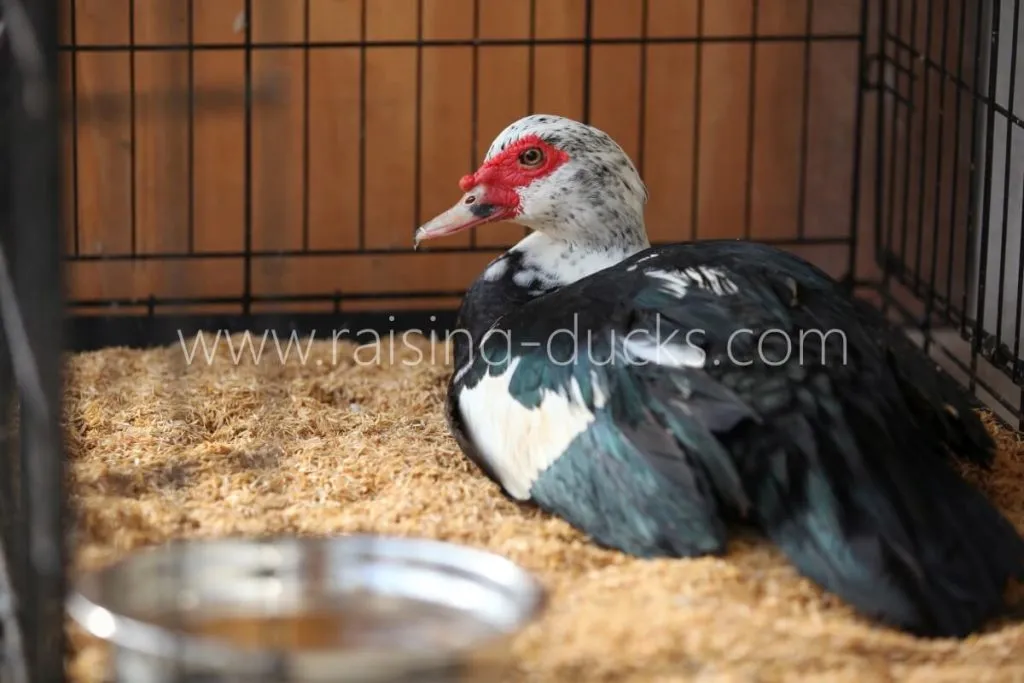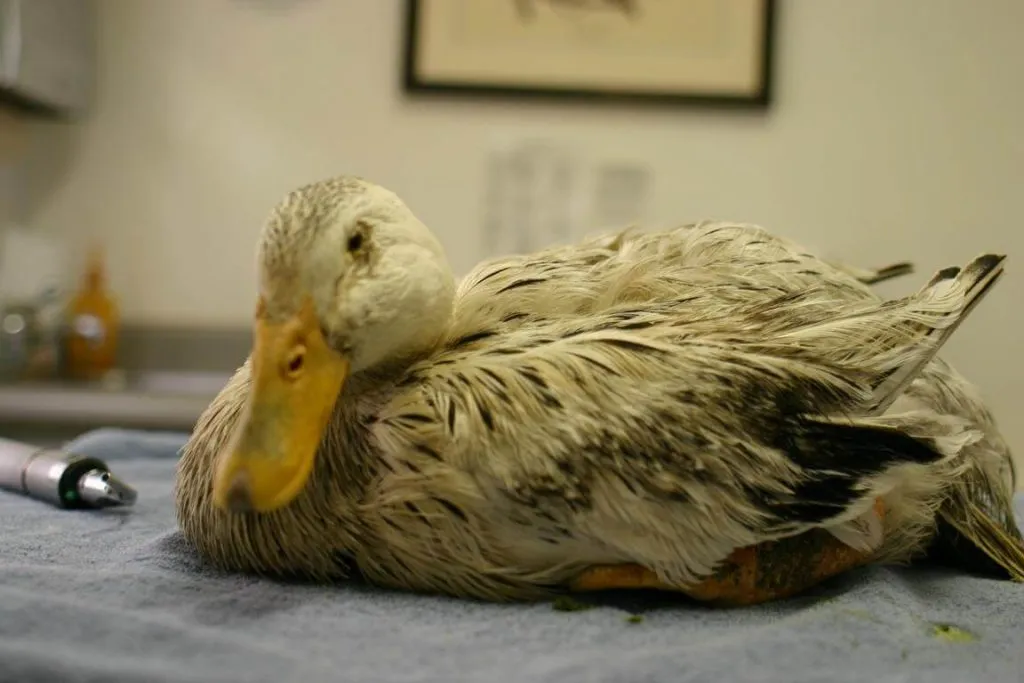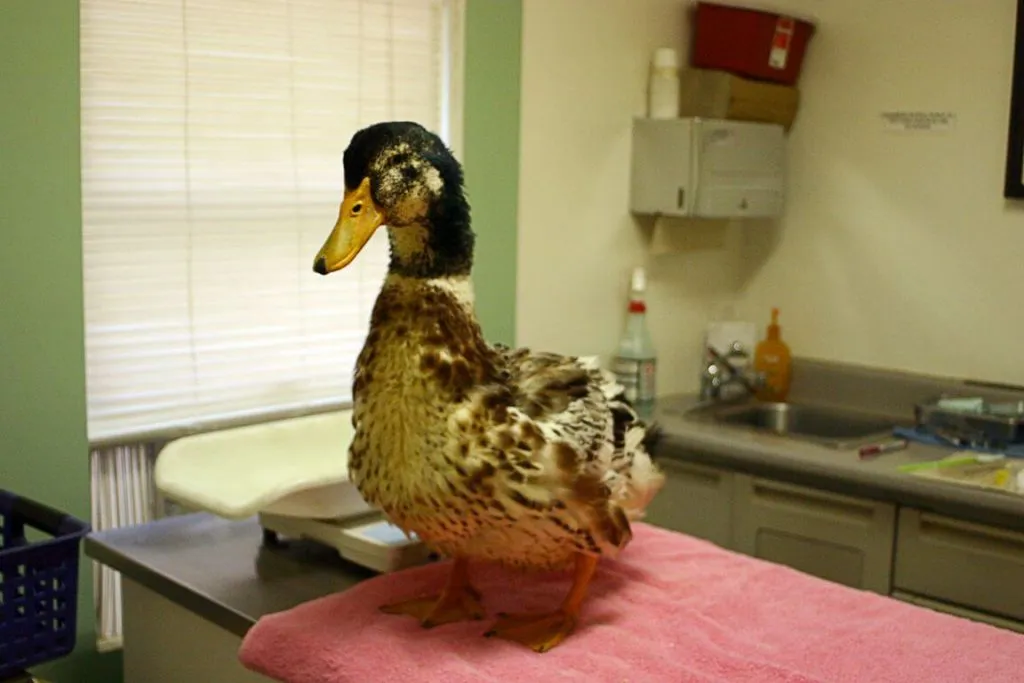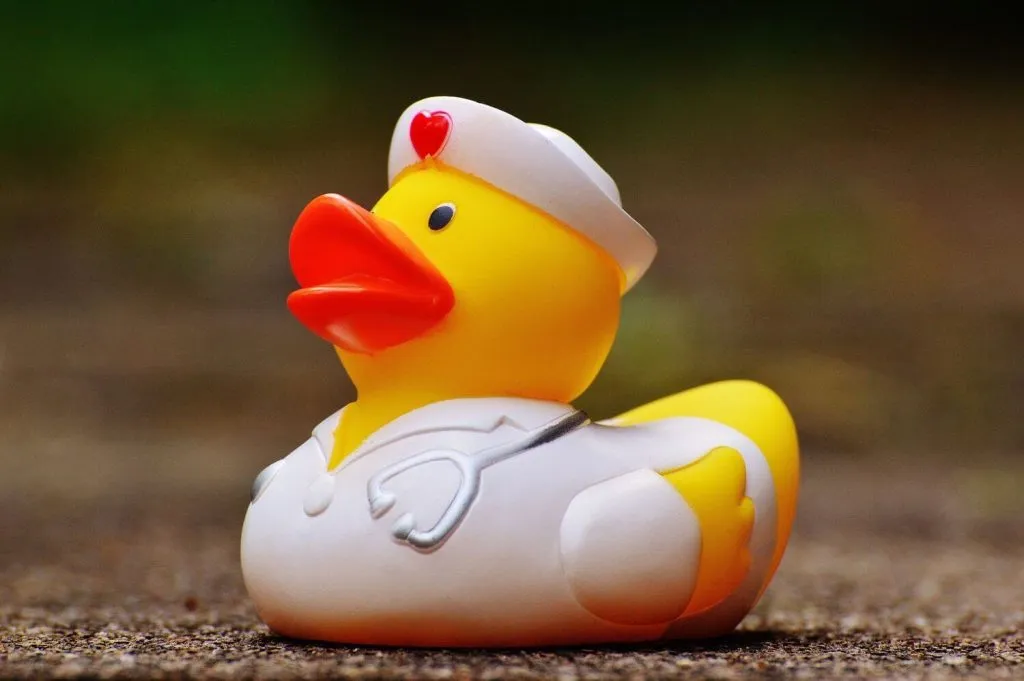When sickness strikes a member of your precious duck flock, it’s scary. You may feel helpless or panicky, not knowing what’s wrong or what you need to do. You might not even know if the duck is really sick—it might just something in your gut telling you that something is not right. Regardless of the severity of the situation, there are several important steps you must take with a sick duck to maximize her chances of survival and start her on the path to recovery.
If you’re in a frantic frenzy and inclined to skim this article, keep in mind that most duck diseases are not going to result in death in a matter of ten minutes. The few that do are diseases for which there is no cure. If tragedy strikes and your duck dies, rest assured that there was nothing you could have done to save her in the ten minutes you spent not knowing what to do. Stay calm. Don’t skim.
Isolation
The first step in caring for a sick duck is quarantine. If you don’t know what’s going on or if the illness might be contagious, don’t take any risks. Contagious diseases can spread faster than a wildfire, and your entire flock could be dead overnight. The quarantine area needs to be at least 40 feet from the rest of the flock because some diseases (such as mycoplasma gallisepticum) are airborne. You’ll also need to have separate food and water supplies for the sick bird. If she survives, the quarantine period must be 4-6 weeks to prevent the duck from spreading the disease to the rest of the flock once she returns. Sorry it has to be that long, but I don’t make the rules.
Even if you’re confident the disease isn’t contagious, pretty much any illness or disease warrants a hospital bed. It makes it easy to monitor and access the duck, and it also gives her a quiet place to rest and recuperate. In addition, looking at poop samples (which are a major clue in diagnosing illness) is difficult when the duck is mingling with others. There’s also the difficulty of examining and treating a duck while simultaneously slapping at mosquitoes and wiping windswept strands of hair out of your face.
Bottom line: take the duck indoors, regardless of the issue. A cardboard box, plastic tote, tub, dog kennel, or pet carrier will suffice as a hospital bed. Be sure the area is draft free but with plenty of ventilation. Also be sure it’s warm (80-85 degrees) because hypothermia is a common side effect of sickness. If it’s anything less than hot outside, it would be a good idea to treat the duck for hypothermia.

When we realized that something was wrong with Kiwi, we quickly moved her to this dog crate so we could monitor and take care of her easily. Fortunately, it wasn’t a sickness, only a sprain, but the crate still helped her rest and made it easy for us to check on her.
Catching the Duck
Once you have a cozy hospital bed ready, it’s time to catch the duck. If she isn’t very friendly, take care when catching her so she does not hurt herself or aggravate the problem. Try to be calm and slow. Don’t chase her; I doubt you’re Usain Bolt. Ducks can be astonishingly fast when they realize danger is hot on their fluffy feathered tails.
Instead, try to funnel her into a small enclosure, corner her, grab her, and try to hold her so she can’t struggle or injure herself. Treats or food may be used, but most sick ducks won’t eat, so a bribe is unlikely to work. Using a net to catch a duck is also an option. Grabbing her feet is not; ducks have extremely fragile legs. However you manage to do it, once you’ve caught her, gently place her in her hospital bed and offer her some water.
Water
Many illnesses will quickly result in dehydration due to either reluctance to drink or reluctance to move to a water source. Thus, administering water is the first step you should take, no matter what the situation is, and especially if you don’t know how long the duck has been unwell. Adding electrolytes to the water is a good idea, as it can help alleviate stress, dehydration, heat exhaustion, diarrhea, and in general can improve the state of a sick duck. Electrolytes can be made at home. Apple cider vinegar is another good addition. It boosts your duck’s immune system, is a natural antiseptic, and is completely safe. Offer food as well, although she may not eat it.
Examination
The next step is examining the duck closely. Aside from whatever obvious symptoms caused you to believe something was wrong, there may be something you’ve missed. This will give you clues and maybe even lead you to your own diagnosis, and it will be helpful to your veterinarian.

This duck is obviously not well. How many symptoms can you spot, just from this picture? (This is not my duck, so I don’t know what was wrong. It’s a rescue duck.) Photo credit: “Very sick girl” (CC BY-NC-ND 2.0) by tifotter
Here is a list of symptoms to check for:
- Is the duck eating? This is one of the biggest telltale signs that something is badly wrong.
- Is she drinking normally, less than normal, or even excessively?
- Are her eyes clear? Or are they cloudy, foamy, emitting a discharge, closed, or something else?
- Are her nares/nostrils clear? Or are they runny, bubbly, or clogged?
- Is she listless and depressed? Was she interacting with her flock members before you caught her?
- Can she walk? Does she seem capable of walking, but reluctant? Is she limping or lame?
- Are her feet normal? Or are there any abrasions, cuts, or swelling?
- Is her vent area dry and clean?
- What does the poop look like? Abnormal poop is a major warning sign. You may wish to take a sample of it, so your veterinarian can do a fecal test. A complete lack of poop, or very little, is also a red flag. (Don’t give your duck anything to eat or drink if you notice that she’s unable to poop.)
- Do her feathers seem healthy? Or are they dirty and ragged? Has there been any unusual feather loss (not to be confused with molting)?
- Are there any odd odors, in either her breath or the poop?
- Is she vomiting, sneezing, coughing, panting excessively, or making any odd noises while breathing?
- Is there swelling anywhere?
- Is there blood anywhere, including in her poop?
- Is she laying eggs normally? Or has she stopped laying? Or are her eggs misshapen, soft-shelled, or otherwise abnormal?
- Does she show any ataxia or lack of coordination? Seizures? Muscle tremors?
- Does her voice sound normal?
- Is there any abnormal head shaking?
- Is she itching a lot?
- Are her wings drooping?
- Do you see any parasites or insects on her skin or in her poop? Look closely under her feathers for signs of parasites.
- Does her neck seem limp, extended, or oddly twisted (torticollis)?
- Does her weight seem normal, or does she seem to have lost or gained weight?
In addition to the physical exam, think about these questions:
- How long have symptoms been present?
- Has she been laying eggs normally? Or has she stopped laying? Or are her eggs misshapen, soft-shelled, or otherwise abnormal?
- Have you gotten any new birds recently?
- Is there only one bird appearing to be sick, or multiple?
- What is her diet? Has it changed recently?
- Has anything else changed recently—her environment, the weather, the flock dynamics?
- Has she had any other problems or injuries recently?
Write down a list of everything you notice.
Diagnosis and Treatment

Next, you need to diagnose and treat your duck, which is unfortunately the most difficult step. Here are your options.
- If you don’t know what’s wrong with your bird, even after examination and maybe some frantic Googling, you should call a veterinarian.
- If you think you know what’s wrong, but you can’t do anything about it yourself or don’t want to take the risk (such as if the problem seems to be a mycoplasma infection, which is hard to treat without a vet’s assistance, or if it’s egg binding, which you can probably treat yourself, but you may wish to let someone more experienced do it), call a veterinarian.
- If you would rather not go to a vet, if it’s a last resort, or if it’s not even an option, many diseases can be treated at home. Even tube feeding, bumblefoot surgery, and coccidiosis treatment can be done at home for those who can’t or won’t get a vet to do it. It just requires a tough stomach, oodles of research, and an acceptance of the fact that things might very well go wrong.

A vet is the safest and best option, in general. Photo credit: “Mean Lady took me to the Vet” (CC BY-NC-ND 2.0) by tifotter
What if you don’t know a veterinarian?
I recommend having a veterinarian with knowledge of avian veterinary care before you even start raising ducks, but if you don’t know an avian vet, now is the time to find one. Here are some resources to help you in your search:
Association of Avian Veterinarians
Recommended Vets in the United States
What if you have a vet, but you can’t get an appointment until next week or some scarily long length of time?
It’s up to you. If the duck seems to be stable, not worsening, and not at death’s door, you might choose to leave her alone and just try to keep her hydrated and hopefully fed until you can get to a vet. If she seems to be in dire need of immediate treatment, or if you just want to help her as soon as possible, you can research and try to find out how to treat her yourself. But take care.
What if there are no avian vets in your area whatsoever?
Avian medicine specialists are few and far between. Many people have no access to one, or no access to one in the near vicinity. And is it really worth it to drive 100 miles just for a duck? For some, it might be, but for others, it isn’t. Treating a sick duck on your own is daunting, but take heart. There’s help for you yet.
Keep in mind that a vet is the only person who can reliably diagnose your duck. Anyone else, including you, is basically just guessing. Your chance of error is much higher than a vet’s, and your treatment capabilities are far from infallible. Nevertheless, treating your duck yourself is certainly an option and one I’m not against. If you’ve decided (or have been forced to) treat your duck yourself, there are three things you can do.
- You can ask for help on a forum or social media, but beware that they are not medical professionals and there is a very real chance that you’ll get bad advice. I’ve found that Backyard Chickens does have several very educated and trustworthy members who often provide quick, trustworthy advice to people with sick or injured poultry (of any species), but they’re still not a replacement for a real vet. Be careful with asking questions online.
- Second comes just plain old research. If you have any poultry books, take a look at their health section. Good old Google is a plethora of information, but as with forums, be careful, try to find trustworthy sources, and do as much research as you can before making any decisions.
- Thirdly, contacting your state veterinary diagnostic laboratory and sending them a stool sample can help you with diagnosis and treatment in the absence of a vet. If your duck dies of unknown causes, this will be especially important in learning what happened so you can prevent the problem from recurring with the rest of your flock.
Depending on where you live, there are some diseases you are required by law to report. If the disease is contagious, then it is very important that you get it properly diagnosed and, if necessary, report it.
Additional Notes

Hopefully, by this point, you have at least a tentative diagnosis and have some ideas for how to treat your duck, whether from a vet’s advice or from your own research. Here are a few tips on treatment and general sick duck care.
If you’re treating your duck at home, adding fresh garlic or oregano to the feed will boost her immune system. Garlic and oregano are also strong natural antibiotics that can actually take the place of the antibiotics a vet might give you, in some cases. Yogurt is also a good idea, but don’t give too much, as it can cause diarrhea in large quantities. The probiotics in yogurt will be good for her, and it can be especially helpful if the duck is egg bound. If the duck isn’t eating or drinking, you will have to force her at some point, probably via tube feeding. If you have a medication that must be administered orally, here’s how.
If you give the bird any drugs, check if there is a withdrawal time for the drug. The withdrawal time is the period of time after administering medication during which you should not consume either meat or eggs from the bird, to avoid consuming drug residue.
Consider euthanasia. Many diseases are difficult or impossible to treat, and putting your poor duck out of her misery might be the kindest option. The earlier you do it, the better. Don’t procrastinate and let her suffer needlessly. Here’s how to humanely euthanize a duck or chicken. If you don’t want to do it yourself, many vets, even those which do not handle poultry normally, will be willing to do it for you.
If, sadly, the duck dies, and you were never sure what was wrong, I recommend getting a necropsy to find out what exactly happened and what caused it, so you can take measures to prevent it from happening to other members of the flock. Some people do their own necropsies. Others send the bird to a laboratory to have the necropsy done.
Finally, think about where this problem could have come from. Illness rarely springs up out of nowhere. Other ducks could be at risk. You need to try to find out what caused it and rectify it, if possible. Consider these questions:
- Is their diet balanced and complete?
- Is their sleeping area dry and warm?
- Is their yard and coop clean?
- Does their environment smell? If there’s an ammonia buildup that’s strong enough for a human to sense, it’s strong enough to be harming your duck’s health.
- Is their area large enough?
- Are there varmints or wild birds around that could spread disease?
- Is their water source appropriate? Ducks need water that is at least deep enough to submerge their entire head.
- If they have a pond or other swimming area, is it stagnant and dirty?
- Is there anything in their living area that could be poisonous?
Whether or not you see an area where you can improve, try not to blame yourself too much. We all live and learn, and sickness can happen in any flock, no matter how well kept. And no matter how hard you try, not all sick ducks can be saved. It’s heartbreaking, especially if the duck was a special pet, but sometimes it’s unavoidable.
On the other hand, many ducks do indeed recover. Ducks are incredibly hardy birds and can bounce back from the direst and most horrendous illnesses. I hope this article has given you hope, abated your panic and fear, silenced the “I don’t know what to do!” echoes, and shown you what path to take. All you need to do is prepare a hospital bed for your sick duck, catch her and quarantine her, offer her food and water, examine her and determine her symptoms, consult a vet if you’re able, get a diagnosis, determine a treatment, give her all the tender loving care you can, and then just hope for everything to work out for the best.
Leave a comment
Your email address will not be published.